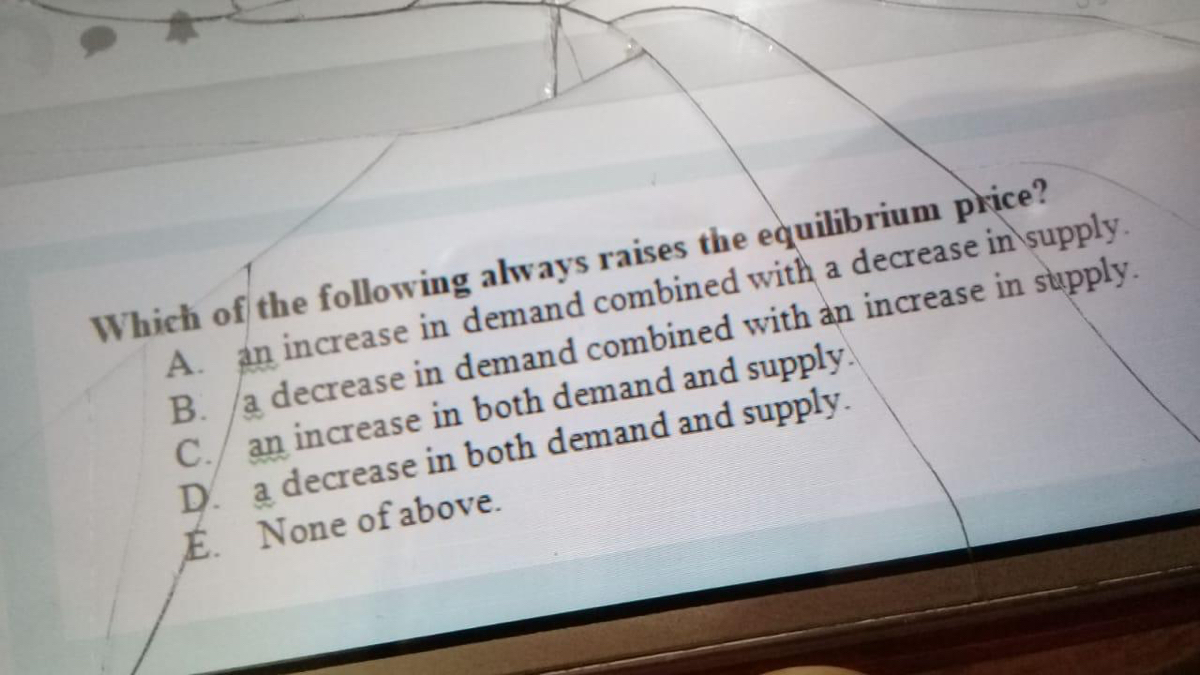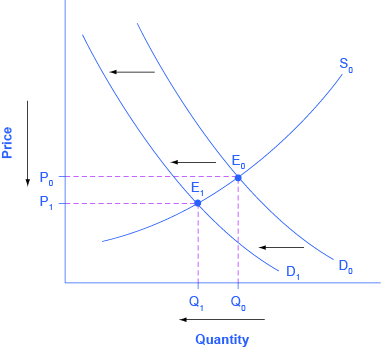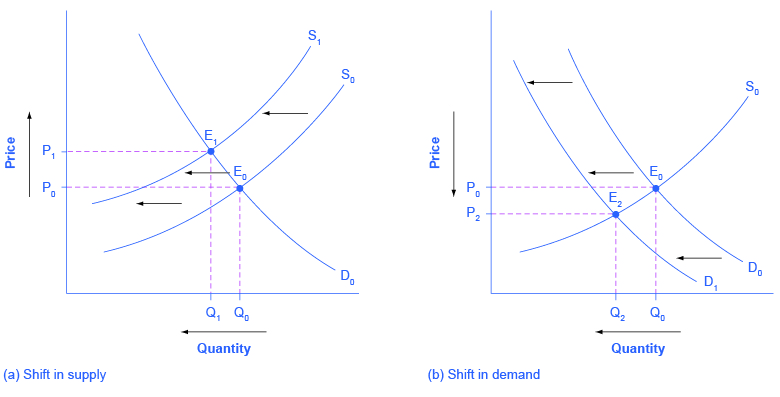Which of the Following Always Raises the Equilibrium Price
A Demand is perfectly inelastic and a firms labour costs fall. Which of the following always raises the equilibrium price.

Answered Which Of The Following Always Raises Bartleby
We provide essay writing help to high school college and university students around the world.

. An increase in the price of beef. All of the above. Analytical 128 In the above figure a change in quantity de- manded with unchanged demand is represen- ted by a movement from A point a to point e.
Similarly an increase in the production costs will decrease supply at any price level thereby increasing the EQ. D a leftward shift of the supply curve of coffee. C an increase in both demand and supply.
An increase in demand combined with a decrease in supply. A decrease in both demand and supply. The third option is correct.
When a market is not in equilibrium A. Which of the following will definitely bartleby. 127 Which of the following will always raise the equilibrium price.
When a product is at market equilibrium theres no pressure from the customer or the company to increase or decrease the price and the supply and demand quantities are in check. Increase equilibrium price and quantity. Aa decrease in both demand and supply Ba decrease in demand combined with an increase in supply 19 Can increase in demand combined with a decrease in supply Dan increase in both demand and supply 20Assume that beef and pork are substitutes for consumers.
This can be caused only by. Quantity demanded exceeds quantity supplied at current price C. 4 A consumer might consider in-line skates and elbow-pads to be.
The equilibrium price can change in case of a technological advancement or lower production costs that will increase the supply of the product at any price level thereby lowering the EQ. Price will go up because of scarcity of a good. If a 20 per-unit tax on CD players raises the equilibrium price paid by consumers by 4 then the supply curve appeared first on Wise Papers.
An increase in the demand combined with a decrease in supply the equilibrium price will rise and the equilibrium quantity might increase decrease or stay the same when the. Assume that consumers are unaware of this future price increase. Equilibrium quantity will decrease.
It is true that the equilibrium quantity will always go up is. Equilibrium price will increase. C demand for a good increases and the supply of it decreases.
Which of the following will happen now. However quantity will go down because with less available there is a lower quantity purchased. Both cause an increase in quantity but increases in demand cause an increase in price while increases in supply cause a decrease in price.
A a decrease in the price of coffee. Identify the new equilibrium and then compare the original equilibrium price and quantity to the new equilibrium price and quantity. Which of the following will definitely cause an increase in the equilibrium price.
At the new equilibrium the equilibrium price falls from 325 to 250 but the equilibrium quantity increases from 250000 to 550000 salmon. A An increase in both demand and supply. When supply goes down the equilibrium will change.
Terms in this set 38 A negative relationship between the quantity demanded and price is called the law of ______. Which of the following always raises the equilibrium price. An increase in demand combined with a decrease in supply.
Government intervention is required to achieve equilibrium. B Demand is perfectly elastic and a firms labour costs rise. Which one of the following situations would lead to an increase in equilibrium price.
D Demand is perfectly inelastic and a firms labour. Which of the following always raises the equilibrium price A. Quantity demanded exceeds quantity supplied at current price.
An increase in the wages of taco shop workers. In the market for tacos you observe that the equilibrium price and quantity have increased. D demand and the supply of a good both decrease.
Current price is above equilibrium D. A shift of a demand curve to the right all other things unchanged will. B a decrease in demand combined with an increase in supply C.
An increase in both demand and supply. This will increase the equilibrium price and quantity. It is always a fair and just price.
Firms will increase contributions to political action committees. B demand and the supply of a good both increase. A a decrease in the price of coffee.
The price point for a product stays stable when its at market equilibrium raises when theres a shortage and decreases when theres a surplus. C an increase in the price of coffee. B a rightward shift in the demand curve for coffee.
19Which of the following always raises the equilibrium price. Due to an early spring freeze lumber companies are expecting the price of lumber to rise next month. The answer is option A an increase in demand.
The equilibrium quantity will increase and the effect of the equilibrium price is undetermined. An increase in both demand and supply A decrease in both demand and supply An increase in demand combined with a decrease in supply A decrease in demand combined with an increase in supply Any of the above depending on the. Which of the following always raises the equilibrium price.
12 The price will rise and the equilibrium quantity might increase decrease or stay the same when the 12 A demand for a good decreases and the supply of it increases. C Supply is perfectly elastic and the price of a substitute good falls. There is surplus at current price B.
View the full answer. The economic motives of sellers and buyers will. The price of a good tend to rise if A.
A Change in Quantity Demanded Versus a Change in Demand Skill. A decrease in demand combined with an increase in supply.

Changes In Equilibrium Price And Quantity The Four Step Process Article Khan Academy

Changes In Equilibrium Price And Quantity The Four Step Process Article Khan Academy

11 Which Of The Following Always Raises The Equilibrium Price 11 A An Increase Course Hero
No comments for "Which of the Following Always Raises the Equilibrium Price"
Post a Comment